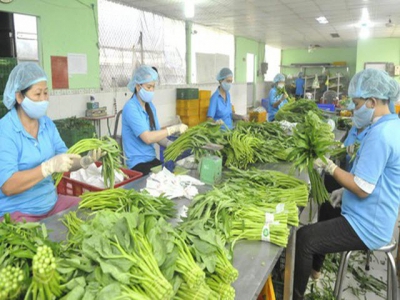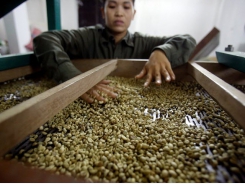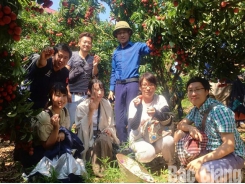Increasing value for Vietnamese agricultural products

Agriculture is one of the most important export sectors of Vietnam, contributing greatly to the general export turnover of the country. However, besides efforts and achievements, agricultural exports have been facing several difficulties and challenges amid global economic integration.
Preliminary processing of vegetables for export and domestic consumption at Phuoc An Agricultural Cooperative in Binh Chanh District in Ho Chi Minh City. (Photo: SGGP)
According to the Agro Processing and Market Development Authority, the processing activity of agricultural products of Vietnam currently is still limited. Most agricultural product processing enterprises still have not taken initiative in the supply source of raw materials ensured in both quantity and quality.
Moreover, the link between stages in the value chain of production, processing and consumption of most product lines is largely inconsistent. Especially, the processing capacity of some product lines remains fairly weak, has not fully used the processing capacity and has not met the demand, especially at the peak time of the crop.
Regarding this field, Mr. Nguyen Ngoc Thanh Trung, Vice Chairman of the Vietnam-Korea Business and Investment Association in Ho Chi Minh City, said that Vietnamese farmers and enterprises focus on quantity only. They merely produce and export raw products so the commercial value is low. He cited that with only the material of sweet potato, Korean enterprises can process into 15 products, they even have sweet potato drink, whereas their Vietnamese counterparts only know to process sweet potatoes by boiling, grilling and drying.
In addition, some enterprises which have exported agricultural products to foreign markets also shared that the biggest barriers currently are quarantine and food safety. Fresh products, especially vegetables and fruits, must always meet the strictest requirements from the markets.
Not only barriers about food safety, such as banned substances and antibiotics, import markets also require that during the production process, but enterprises must also meet requirements on sociality, humanity and responsibility to protect natural resources.
The representative of a cooperative in District 7 in Ho Chi Minh City said that his cooperative used to send dragon fruits to Europe and realized that the biggest barrier to farmers is capital. Farmers know how to sell their products but they do not have enough money to follow standards. There are several loan support programs but it is difficult for farmers to get those loans. The State needs to actively help farmers to access the source of capital. In addition, authorities need a long-term overview to evaluate the market and support farmers in developing production sustainably and for a long time.
In recent years, ‘rescuing farm produce’ has become a familiar phrase as at harvest season, the prices of several agricultural products dropped drastically or farmers even had to dump their crops because they were unsalable. The common point of most agricultural products is that they were grown massively, without the planning, without the understanding of the consumer market as well as labels, origin, or relevant technical specifications.
Experts said that for that situation to no longer happen, it is necessary to carry out standards of clean agricultural products to have more opportunities for consumption and processing. It is essential to raise awareness, guide farmers in clean farming and grant certificates then constantly check their compliance until farmers are self-aware and voluntarily comply with the requirements for their benefits.
Export enterprises need to promote investment in modern technology for intensive processing to increase value for products, actively meet regulations of import markets and ensure sustainability for export.
Ms. Bui Thanh Huong from the Department of Plant Protection said that to ensure product safety, the Ministry of Agriculture and Rural Development has been asking enterprises to implement chain production and control and must control well the use of plant protection drugs during the production process of agricultural products, from growers to traders and exporters.
Management authorities must timely inform provinces and export enterprises the requirements and regulations on food safety of import countries. As for management on plant protection drugs, the MARD has also tightened the registration, production, trading and using of them and built communication model to encourage farmers to use biological plant protection drugs as well as encourage traders to sell biological plant protection drugs, aiming to get around 30 percent of environmentally-friendly biological plant protection drugs in the catalog.
Vietnam has signed several free trade agreements to widen the export market. The attractiveness of these markets also means that Vietnam has to face great competition pressure from China, Thailand and, lately, Cambodia whose export products are similar to Vietnam.
Moreover, Vietnamese export products have to pass technical barriers, especially in terms of quality, food safety and traceability. To succeed in each market, it is necessary to understand the specific characteristics of that market, especially the climate, market size, consumer and cultural characteristics; improve the quality of export goods to meet the standards and quality standards of importing countries.
The EU and South Korea are outstanding markets with strict regulations on maximum residue levels (MRLs) for imported agro-aquatic products. From January 1, 2019, South Korea officially tightened the category of plant protection drugs on imported products from countries, including Vietnam. The EU also set the MRLs used in and on food products. For fresh vegetables and fruits, strictly complying with regulations on MRLs and preventing bacterial contamination are prerequisite conditions if enterprises want to enter the EU market. Therefore, enterprises need to check with their customers about regulations applied for exported fresh vegetables and fruits.
Có thể bạn quan tâm
Phần mềm

Phối trộn thức ăn chăn nuôi

Pha dung dịch thủy canh

Định mức cho tôm ăn

Phối trộn phân bón NPK

Xác định tỷ lệ tôm sống

Chuyển đổi đơn vị phân bón

Xác định công suất sục khí

Chuyển đổi đơn vị tôm

Tính diện tích nhà kính

Tính thể tích ao hồ



 Turmeric offers remedy that profits farmers
Turmeric offers remedy that profits farmers  Bac Giang actively prepares conditions for exporting lychees…
Bac Giang actively prepares conditions for exporting lychees…